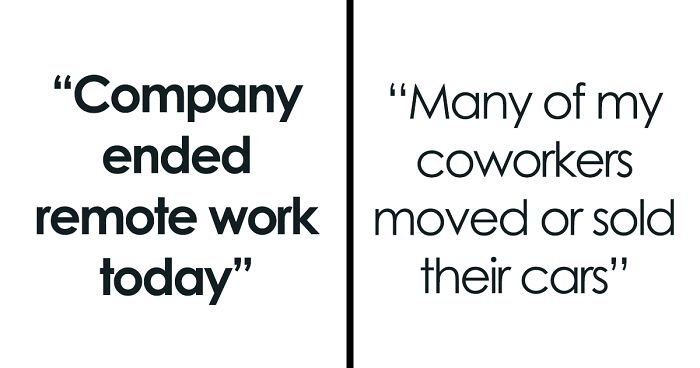
Company Breaks Promise That “Working From Home Would Be Permanent” And Workers Are Angry
Trust is the cornerstone of a successful work environment, but as Reddit user Junostation showed in their recent post on r/antiwork, it can be easily shattered.
After experiencing the joys of remote work for three fulfilling years, they now find themselves caught in a distressing situation. The executive team, who previously praised the benefits of such an arrangement, suddenly announced a mandatory return to the office.
The company’s abrupt reversal not only jeopardizes its employees’ confidence in the management’s decision-making process but also poses significant challenges to the everyday routine that they’ve structured around the previous system.
This worker was promised remote work by his employer, and together with their colleagues, they have built their lives around that promise
Image credits: Israel Andrade (not the actual photo)
But it was suddenly revoked
Image credits: olia danilevich (not the actual photo)
Image credits: junostation
The vast majority of Americans, just like the author of this post, enjoy working remotely
When the pandemic shut down workplaces in many places across the globe, society was forced to participate in a mass work-from-home experiment.
According to McKinsey’s American Opportunity Survey, 58 percent of workers from the United States had the opportunity to work from home at least one day a week, while 35 percent could work from home five days a week.
What makes these numbers particularly notable is that respondents worked in all kinds of jobs, in every part of the country and sector of the economy, including traditionally labeled blue-collar jobs that might be expected to demand on-site labor as well as white-collar professions.
Another of the survey’s revelations was the fact then when people have the chance to work flexibly, 87 percent of them take it. This dynamic is also widespread across demographics, occupations, and geographies. The flexible working world was born of a frenzied reaction to a sudden crisis but has remained a desirable job feature for millions. This represents a tectonic shift in where, when, and how Americans want to work.
According to a third-party survey from Prodoscore, the leader in employee visibility and productivity intelligence software, the overwhelming majority of Americans (82.3%) are happier working remotely vs. working in the office.
Image credits: Nataliya Vaitkevich (not the actual photo)
But some companies are still making them come back to the office
However, some companies are claiming they need their employees back in the office for the sake of productivity. For example, Elon Musk, the CEO of Tesla, claimed that those working remotely only “pretend to work” and are “phoning it in.”
But David Powell, president of Prodoscore, said their data showed that if an employee was highly productive in-office, they’ll be productive at home and likewise if an employee slacked off at the office, they’ll do the same at home. “After evaluating over 105 million data points from 30,000 U.S.-based Prodoscore users, we discovered a five percent increase in productivity during the pandemic work-from-home period,” he explained.
So what gives? Why are Junostation and so many others being forced back? Gleb Tsipursky, CEO of Disaster Avoidance Experts, who is a behavioral scientist helping executives make wise decisions and manage risks, thinks too many old-school managers prefer a rigid, top-down power structure and do not like giving up control over their teams.
Plus, there’s evidence that some companies such as Twitter are using return-to-office mandates to get workers to quit voluntarily, to avoid paying severance.
Image credits: CoWomen (not the actual photo)
Which experts believe to be a prime example of how cognitive biases lead to poor decision-making
“The pandemic has accelerated the trend toward remote work, and workers are now resisting the idea of returning to the office,” Tsipursky wrote. “Many workers have become accustomed to the flexibility and freedom that come with remote work, and employers who refuse to allow it are facing backlash.”
“Employers are forcing their employees back to the office to impose control over workers, but they are failing to recognize that remote work enables worker power. In fact, remote work is empowering workers by giving them more control over their lives and work. With remote work, workers can choose where and when to work, which gives them more control over their schedules and their work-life balance.”
Tsipursky believes that the drive to return employees to the office to regain control over them is a prime example of how cognitive biases can lead to poor decision-making.
“The dangers of cognitive biases in this context are significant. By ignoring the benefits of remote work and forcing their employees back to the office, employers risk alienating their workers, and they may also be creating a situation where workers are more likely to unionize,” he said.
“It is time for employers to recognize the value of remote work and to work with their employees to create hybrid or remote work arrangements that meet the needs of both parties. Employers who do so will enjoy a happier and more productive workforce, while those who refuse to adapt risk falling behind in a rapidly changing world.”
As the post went viral, it received a lot reactions
And some people also shared their own similar experiences
As someone who's job can't be done remotely, I would love it if you all were able to stay WFH. It would make my commute amazing. :)
Same. I work in a lab so I need to be where the cool science equipment is. But the commute would be better if people who wanted to WFH were allowed too. Gas prices are high again anyway. It would be better for the environment too.
Load More Replies...I work in IT and was hired into my role specifically as an FTE remote worker. I live several hundred miles from our nearest office. I make this argument: I work with offshore resources every freaking day...India, Pakistan, etc. I have full development teams all the way around the globe whose work I depend on (and vice versa). Since the advent of offshoring, teams have had to collaborate across time zones and cultures, and with even less technical capability than we have now (WebEx, anyone? Or bridge calls?) This is 100% about real estate, gasoline, and urban/suburban retail support. Utter garbage.
Its all about the building owners, Lord Sugar in the UK is one and his is constantly calling people who work from home "lazy", its all about money and the narrative being created is one of lazyness.
That would be commercial property investor Lord Sugar. ;)
Load More Replies...As someone who's job can't be done remotely, I would love it if you all were able to stay WFH. It would make my commute amazing. :)
Same. I work in a lab so I need to be where the cool science equipment is. But the commute would be better if people who wanted to WFH were allowed too. Gas prices are high again anyway. It would be better for the environment too.
Load More Replies...I work in IT and was hired into my role specifically as an FTE remote worker. I live several hundred miles from our nearest office. I make this argument: I work with offshore resources every freaking day...India, Pakistan, etc. I have full development teams all the way around the globe whose work I depend on (and vice versa). Since the advent of offshoring, teams have had to collaborate across time zones and cultures, and with even less technical capability than we have now (WebEx, anyone? Or bridge calls?) This is 100% about real estate, gasoline, and urban/suburban retail support. Utter garbage.
Its all about the building owners, Lord Sugar in the UK is one and his is constantly calling people who work from home "lazy", its all about money and the narrative being created is one of lazyness.
That would be commercial property investor Lord Sugar. ;)
Load More Replies...
 Dark Mode
Dark Mode 

 No fees, cancel anytime
No fees, cancel anytime 







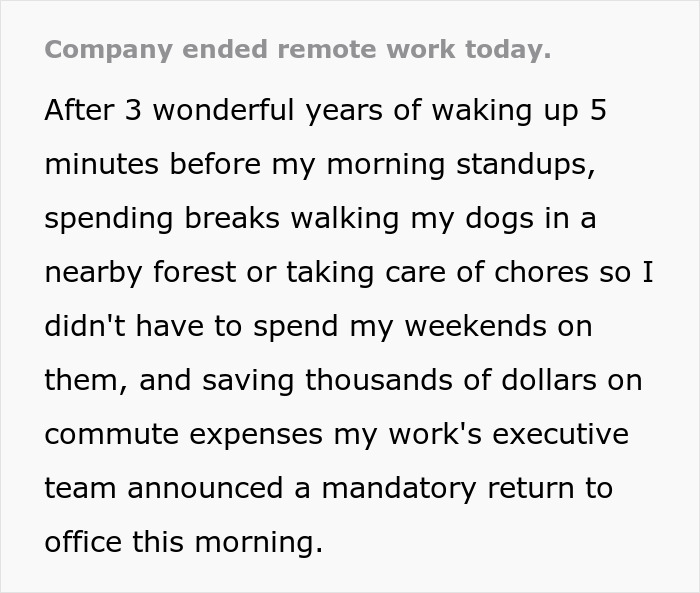
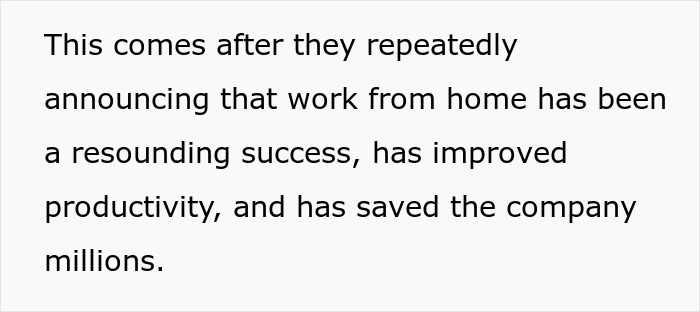


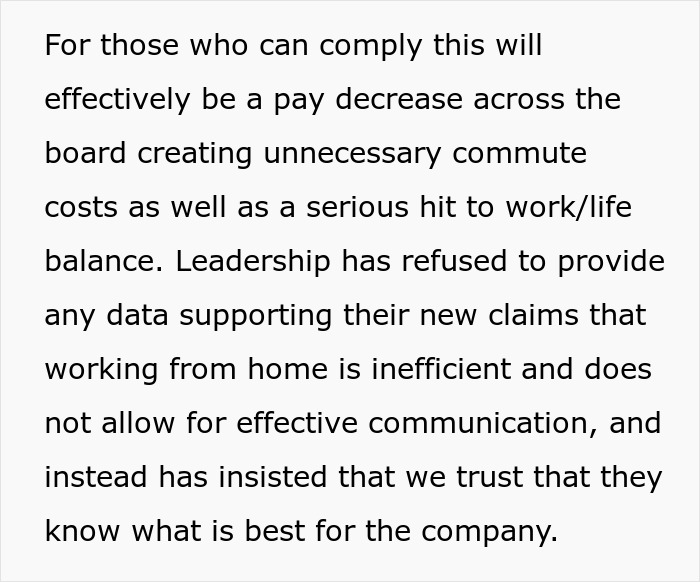
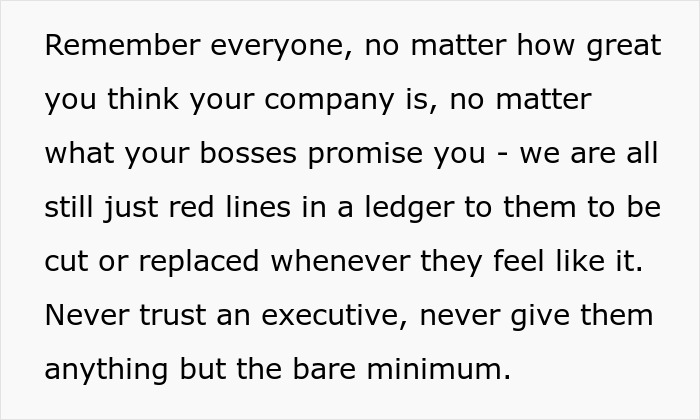



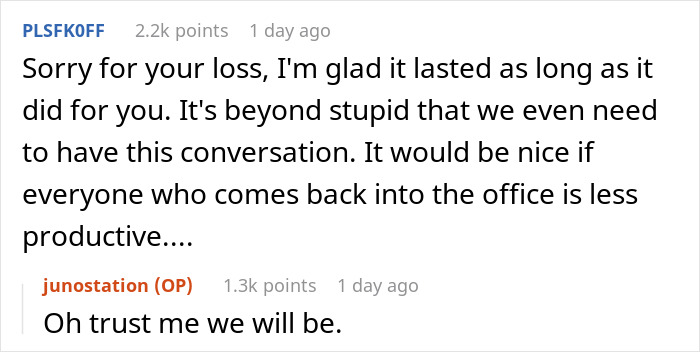
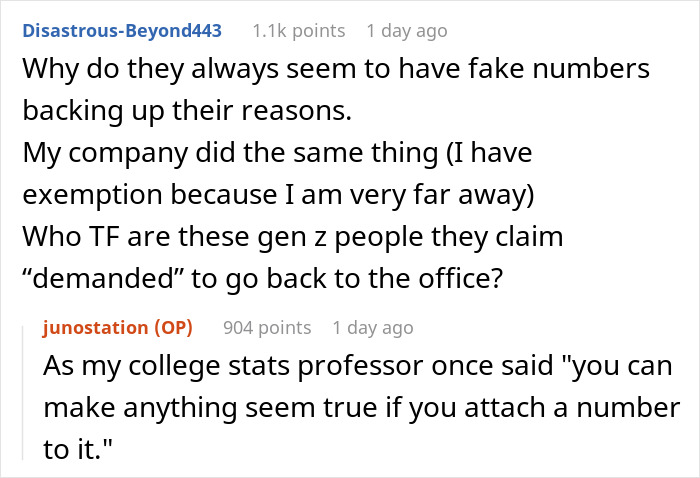
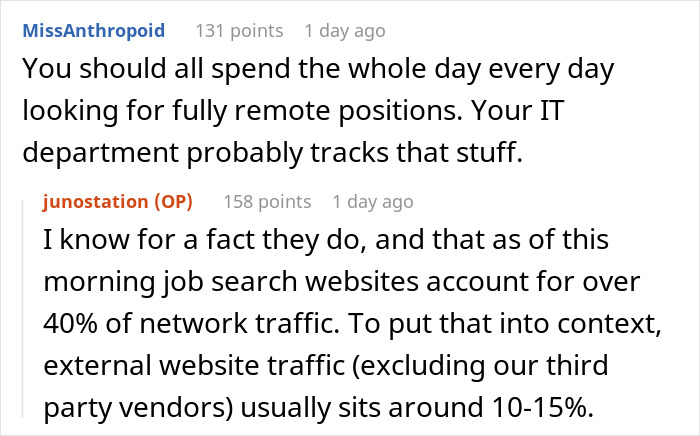
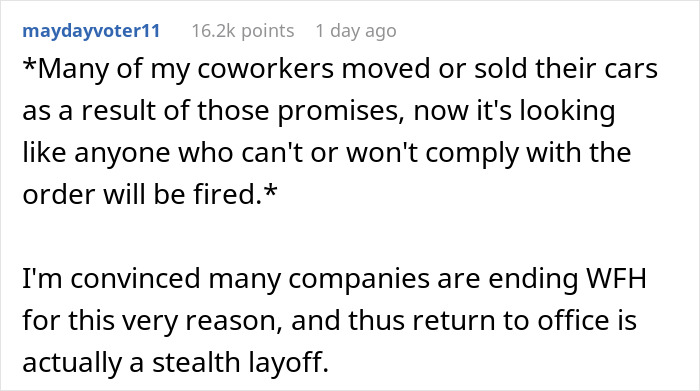
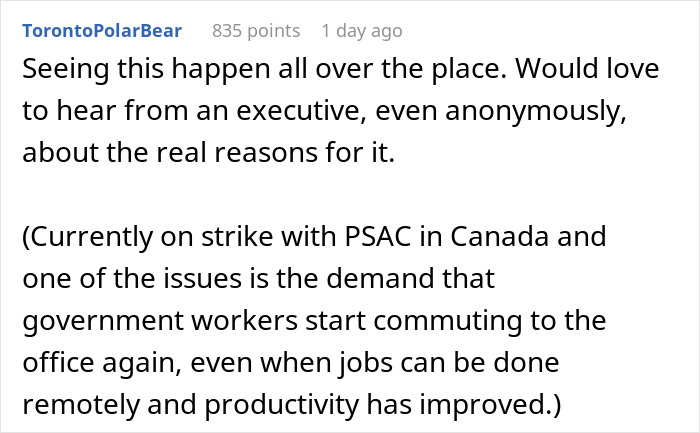








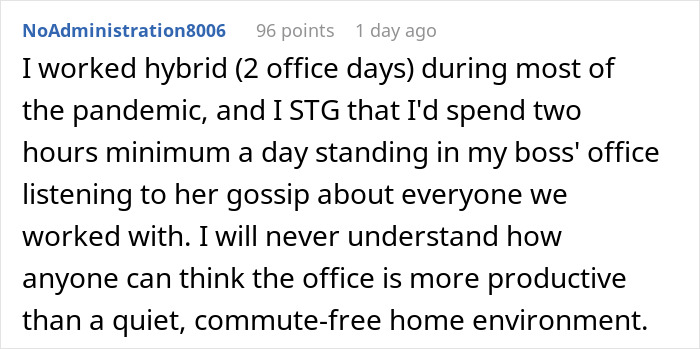
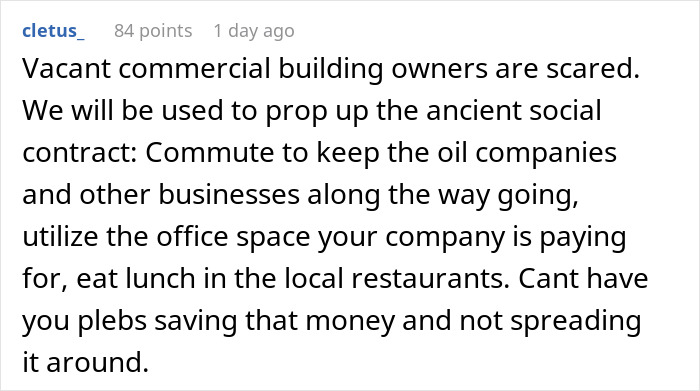

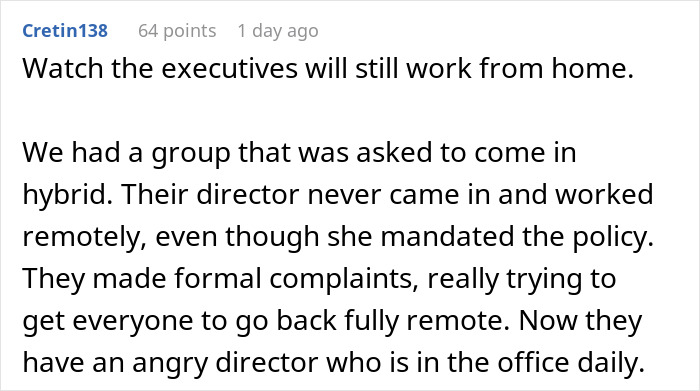
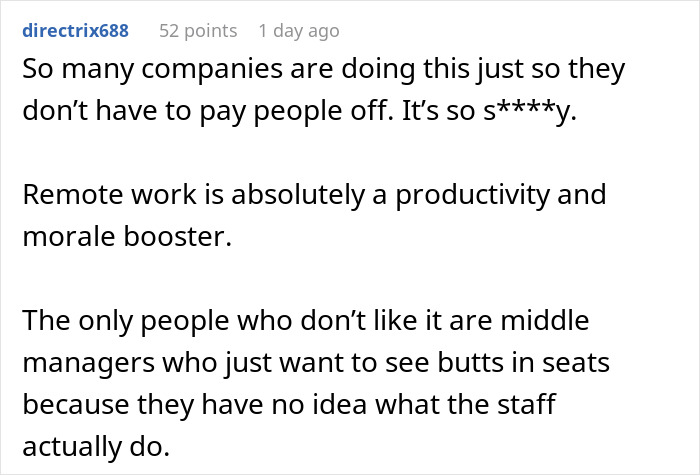

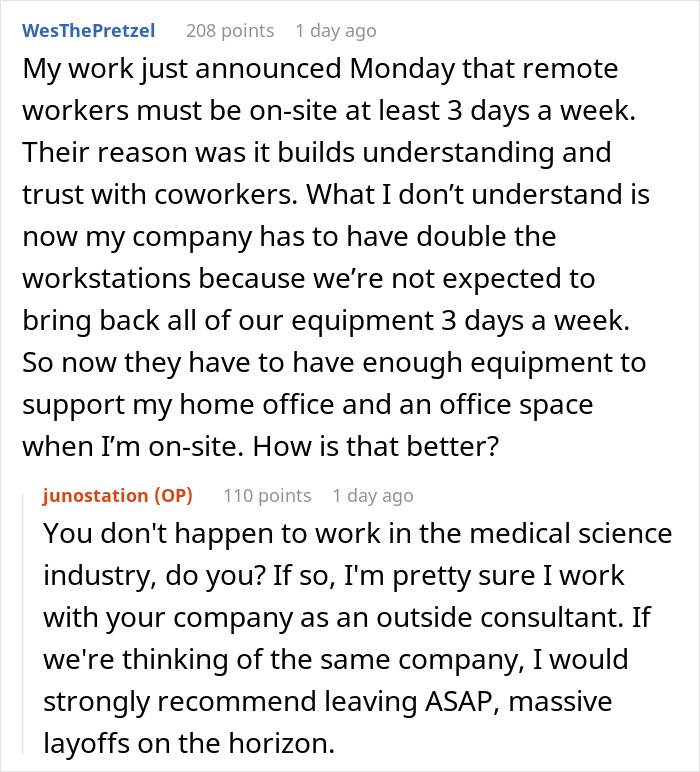
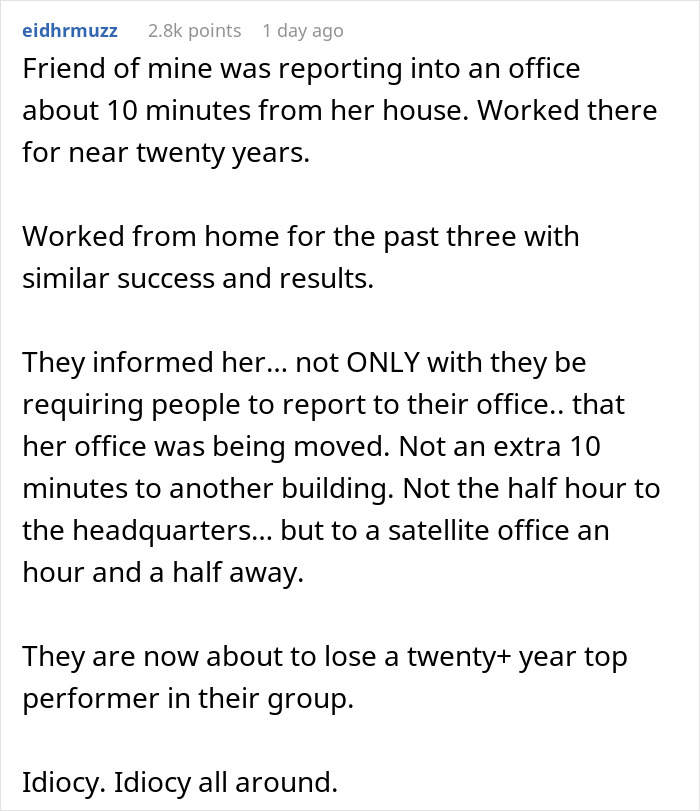
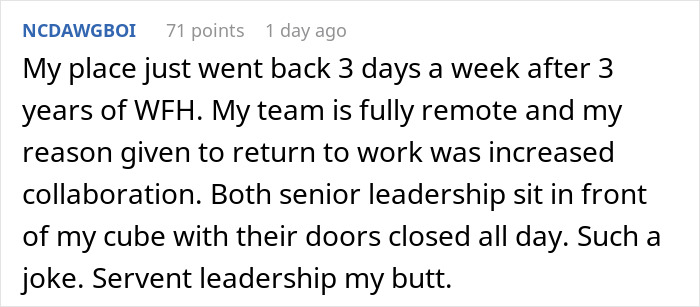












































58
47